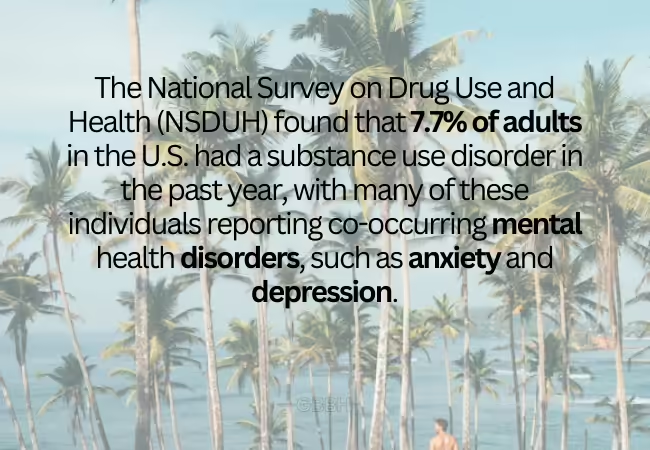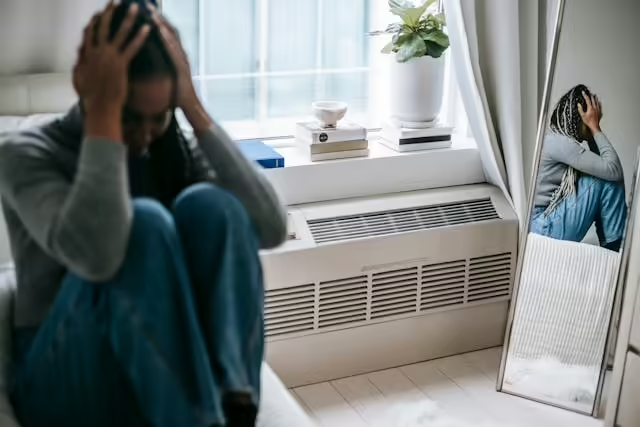Anxiety and addiction are deeply intertwined, creating a complex cycle that can be difficult to break without targeted treatment. At Greater Boston Behavioral Health, we understand that to achieve lasting recovery, individuals need comprehensive support that addresses both conditions. This detailed guide will explore the nature of the connection between anxiety and addiction, practical tips for managing symptoms, and how professional treatment can help you navigate these challenges.
Understanding Anxiety and Its Triggers
Anxiety is a complex mental health condition that goes beyond simple stress or worry. It can manifest as persistent fear, restlessness, or overwhelming thoughts that interfere with daily activities. While everyone experiences anxiety from time to time, when it becomes chronic, it can be classified as an anxiety disorder. Common types include generalized anxiety disorder (GAD), panic disorder, social anxiety disorder, and specific phobias.
Triggers for anxiety are varied and can be personal. For some, it may be rooted in past trauma, ongoing stress from work or school, or health concerns. Environmental factors like financial instability, family dynamics, and social isolation can also contribute to heightened anxiety. Identifying individual triggers is a crucial step in developing effective coping mechanisms.
The Impact of Anxiety on Daily Life
Anxiety can have a profound impact on one’s ability to function day-to-day. It may lead to difficulties concentrating, making decisions, and engaging in social activities. People who experience severe anxiety often struggle with sleep disturbances, fatigue, and a lack of motivation. Over time, chronic anxiety can impact relationships, as individuals may withdraw or become irritable due to stress.
The physical effects of anxiety can include headaches, stomachaches, and muscle tension, making it harder for the body to relax and recover. For those managing anxiety alongside substance use, these impacts can be even more pronounced, creating a cycle of discomfort that drives them to self-medicate.
The Complex Relationship Between Anxiety and Addiction
Anxiety disorders are among the most prevalent mental health conditions in the U.S., impacting millions of people every year. When left untreated, anxiety can lead to the development of substance use disorders as individuals seek relief through alcohol, drugs, or other substances. This form of self-medication may provide temporary relief from the emotional distress of anxiety, but it often worsens the underlying problem, creating a cycle of dependence and increasing the risk of addiction.
Substance use itself can exacerbate anxiety over time. Alcohol and drugs impact brain chemistry, leading to changes that can contribute to heightened anxiety, mood swings, and even more severe mental health symptoms. This creates a dangerous feedback loop: anxiety leads to substance use, and substance use increases anxiety, pushing individuals further into addiction.
Recognizing the Signs of Anxiety and Addiction
Understanding the warning signs of both anxiety and addiction is essential to getting the right help. Some common signs include:
- Anxiety Symptoms: Excessive worry, racing thoughts, irritability, muscle tension, fatigue, and sleep disturbances.
- Addiction Symptoms: Cravings, withdrawal symptoms, neglect of responsibilities, using substances to cope, and an inability to stop or cut down despite negative consequences.
If you recognize these signs in yourself or a loved one, it’s crucial to seek support from a mental health treatment center in Massachusetts or a specialized facility that can address both conditions simultaneously.
The Benefits of Integrating Therapy for Anxiety and Addiction
Integrated treatment approaches that address both anxiety and addiction are highly effective because they treat the whole person, not just one symptom. Cognitive-behavioral therapy (CBT) is a cornerstone of therapy for both conditions, helping individuals identify and reframe negative thought patterns. Dialectical behavior therapy (DBT) can be especially helpful, as it teaches emotional regulation and mindfulness skills that reduce anxiety and improve coping mechanisms.
Therapy helps individuals learn healthier ways to manage stress, improve self-awareness, and build resilience. Through a comprehensive treatment plan, patients can develop strategies to prevent relapse and strengthen their emotional well-being. Mental health treatment centers that offer dual-diagnosis programs can create customized plans that address both anxiety and addiction simultaneously.

Tips for Managing Anxiety Without Turning to Substances
- Develop a Strong Support System: Connecting with friends, family, or support groups can help reduce feelings of isolation and offer emotional support. Talking to others who are also managing anxiety or addiction can be especially validating.
- Engage in Cognitive-Behavioral Therapy (CBT): CBT is a highly effective treatment for both anxiety and addiction. This form of therapy helps individuals identify negative thought patterns and replace them with healthier ways of thinking and behaving.
- Practice Mindfulness and Meditation: Mindfulness techniques help individuals stay present and aware, reducing overthinking and providing tools for better emotional regulation. Simple practices such as deep breathing, guided meditation, or progressive muscle relaxation can help manage anxiety in real-time.
- Exercise Regularly: Physical activity releases endorphins and reduces stress hormones, contributing to improved mood and overall mental health. Whether it’s going for a walk, yoga, or a more vigorous workout, regular exercise can be a powerful tool in managing anxiety and maintaining sobriety.
- Prioritize Sleep and Nutrition: A well-balanced diet and consistent sleep schedule can significantly improve mental health and reduce anxiety symptoms. Sleep deprivation can worsen anxiety, making it even more difficult to resist the urge to turn to substances.
Practical Tips for Managing Anxiety Without Resorting to Substances
Managing anxiety without turning to substances involves building a toolkit of healthy coping strategies. These might include:
- Mindfulness and Meditation: Regular mindfulness exercises can help anchor thoughts and create a sense of calm. Practicing deep breathing and meditation helps reduce anxiety levels over time.
- Physical Activity: Exercise has been shown to boost endorphins, which can alleviate anxiety and improve mood. Simple activities like walking, jogging, or yoga can make a significant difference.
- Journaling: Writing down your thoughts can help organize them, reduce worry, and identify triggers. Keeping a gratitude journal can also promote positive thinking.
- Social Support: Reaching out to friends or joining support groups can foster connection and reduce feelings of isolation.
- Routine and Structure: Establishing a daily routine helps maintain balance and predictability, which can lower anxiety levels.
Why Professional Treatment Is Important
While self-help techniques are useful, they are often not enough when dealing with severe or chronic anxiety and addiction. Professional treatment provides a structured and supportive environment where individuals can address the root causes of their anxiety while learning new coping strategies.
Mental health treatment centers in Massachusetts offer specialized programs such as Intensive Outpatient Programs (IOP) and Partial Hospitalization Programs (PHP). These programs combine individual and group therapy, medication management, and educational resources to help individuals recover. For those struggling with both anxiety and addiction, seeking professional treatment can be life-changing, as it provides access to trained therapists, medical experts, and a network of peers who understand the challenges.
How Professional Treatment Can Help
Managing anxiety and addiction often requires the help of mental health treatment programs. Comprehensive care that targets both issues at once can be transformative. At Greater Boston Behavioral Health, we offer tailored treatment plans that combine evidence-based therapies and personalized care strategies:
- Cognitive-Behavioral Therapy (CBT): A cornerstone of many mental health programs, CBT helps individuals reframe their thought patterns to break the cycle of anxiety and substance use. It equips individuals with coping mechanisms and skills to manage stress without resorting to substances.
- Dialectical Behavior Therapy (DBT): This therapy is especially effective for individuals struggling with emotional regulation. DBT focuses on mindfulness, distress tolerance, emotion regulation, and interpersonal effectiveness. These skills help individuals manage the symptoms of both anxiety and addiction while building resilience.
- Intensive Outpatient Program (IOP): An IOP allows patients to receive structured therapy and treatment while maintaining their daily routines. This program is ideal for individuals who need support but do not require full-time inpatient care.
- Partial Hospitalization Program (PHP): For individuals who require more intensive care during the day, PHP offers comprehensive treatment with therapy sessions and medical support but allows patients to return home at night.
Why Greater Boston Behavioral Health?
Choosing the right treatment center can make a significant difference in your path to recovery. At Greater Boston Behavioral Health, our team of skilled therapists and clinicians is dedicated to offering compassionate, evidence-based care tailored to your specific needs. We understand the unique challenges of managing anxiety and addiction, and our integrated treatment programs are designed to support lasting recovery.
We provide personalized treatment plans that can include group therapy sessions, individual counseling, and family therapy to build a solid support network. Our goal is to help you develop healthy coping mechanisms, improve your emotional well-being, and gain control over your life.
Final Thoughts
Anxiety and addiction can be a daunting combination to navigate, but it’s essential to know that recovery is possible with the right treatment and support. If you or someone you care about is struggling, don’t hesitate to reach out to a trusted mental health treatment center in Massachusetts. At Greater Boston Behavioral Health, we are here to help guide you through every step of your journey toward healing and well-being. Call us at (888)278-0716 today to learn more about our services and how we can help you on your journey to recovery!
FAQs on Managing Anxiety and Addiction
What is the connection between anxiety and addiction?
Anxiety and addiction are often linked, as individuals may use substances to self-medicate the discomfort of anxiety. This can create a cycle where anxiety leads to substance use, and substance use exacerbates anxiety, making it difficult to manage either condition without proper treatment.
How can therapy help with anxiety and addiction?
Therapies such as Cognitive-Behavioral Therapy (CBT) and Dialectical Behavior Therapy (DBT) are effective for treating both anxiety and addiction. These therapies help individuals identify negative thought patterns, develop coping strategies, and build emotional resilience to manage stress without turning to substances.
What are some practical tips for managing anxiety without using substances?
Some effective tips include practicing mindfulness and meditation, engaging in physical activities, journaling to process thoughts, maintaining a daily routine, and seeking support from friends or support groups.
When should I seek professional help for anxiety and addiction?
If anxiety and addiction are interfering with daily life, work, or relationships, it’s essential to seek professional help. Treatment programs, such as Intensive Outpatient Programs (IOP) and Partial Hospitalization Programs (PHP), provide the support needed to address both issues effectively.
Why is professional treatment important for managing anxiety and addiction?
Professional treatment offers specialized care and a structured environment, allowing individuals to address the root causes of their anxiety and addiction. Access to therapy, medical support, and peer networks significantly increases the chances of long-term recovery and well-being.

